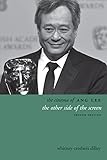The Cinema of Ang Lee : The Other Side of the Screen / Whitney Crothers Dilley.
Material type: TextSeries: Directors' CutsPublisher: New York, NY : Columbia University Press, [2014]Copyright date: ©2014Edition: second editionDescription: 1 online resource (248 p.) : 13 b&w photographsContent type:
TextSeries: Directors' CutsPublisher: New York, NY : Columbia University Press, [2014]Copyright date: ©2014Edition: second editionDescription: 1 online resource (248 p.) : 13 b&w photographsContent type: - 9780231167734
- 9780231538497
- 791.430233092 23
- PN1998.3.L438 D55 2015
- PN1998.3
- online - DeGruyter
- Issued also in print.
| Item type | Current library | Call number | URL | Status | Notes | Barcode | |
|---|---|---|---|---|---|---|---|
 eBook
eBook
|
Biblioteca "Angelicum" Pont. Univ. S.Tommaso d'Aquino Nuvola online | online - DeGruyter (Browse shelf(Opens below)) | Online access | Not for loan (Accesso limitato) | Accesso per gli utenti autorizzati / Access for authorized users | (dgr)9780231538497 |
Frontmatter -- Contents -- Acknowledgments -- Note on Transliteration -- 1. Introduction: Ang Lee - A History -- 2. Ang Lee as Director: His Position in Asian and World Cinema -- 3. Confucian Values and Cultural Displacement in Pushing Hands -- 4. Transgressing Boundaries of Gender and Culture in The Wedding Banquet -- 5. Globalization and Cultural Identity in Eat Drink Man Woman -- 6. Opposition and Resolution in Sense and Sensibility -- 7. Fragmentary Narratives/Fragmented Identities in The Ice Storm -- 8. Race, Gender, Class, and Social Identity in Ride with the Devil -- 9. Wuxia Narrative and Transnational Chinese Identity in Crouching Tiger, Hidden Dragon -- 10. The Ultimate Outsider: Hulk -- 11. Transcending Gender in Brokeback Mountain -- 12. Eroticism and Performance in Lust/Caution -- 13. Memory, Narrative, and Transformation in Taking Woodstock -- 14. Storytelling and Truth in Life of Pi: A Spiritual Journey -- 15. Conclusion: The Dream of Cinema -- Notes -- Bibliography -- Index
restricted access online access with authorization star
http://purl.org/coar/access_right/c_16ec
Born in Taiwan, Ang Lee is one of cinema's most versatile and daring directors. His ability to cut across cultural, national, and sexual boundaries has given him recognition in all corners of the world, the ability to work with complete artistic freedom whether inside or outside of Hollywood, and two Academy Awards for Best Director. He has won astounding critical acclaim for Crouching Tiger, Hidden Dragon (2000), which transformed the status of martial arts films across the globe, Brokeback Mountain (2005), which challenged the reception and presentation of homosexuality in mainstream cinema, and Life of Pi (2012), Lee's first use of groundbreaking 3D technology and his first foray into complex spiritual themes.In this volume, the only full-length study of Lee's work, Whitney Crothers Dilley analyzes all of his career to date: Lee's early Chinese trilogy films (including The Wedding Banquet, 1993, and Eat Drink Man Woman, 1994), period drama (Sense and Sensibility, 1995), martial arts (Crouching Tiger, Hidden Dragon, 2000), blockbusters (Hulk, 2003), and intimate portraits of wartime psychology, from the Confederate side of the Civil War (Ride with the Devil, 1999) to Japanese-occupied Shanghai (Lust/Caution, 2007). Dilley examines Lee's favored themes such as father/son relationships and intergenerational conflict in The Ice Storm (1997) and Taking Woodstock (2009). By looking at the beginnings of Lee's career, Dilley positions the filmmaker's work within the roots of the Taiwan New Cinema movement, as well as the larger context of world cinema. Using suggestive readings of both gender and identity, this new study not only provides a valuable academic resource but also an enjoyable read that uncovers the enormous appeal of this acclaimed director.
Issued also in print.
Mode of access: Internet via World Wide Web.
In English.
Description based on online resource; title from PDF title page (publisher's Web site, viewed 02. Mrz 2022)


